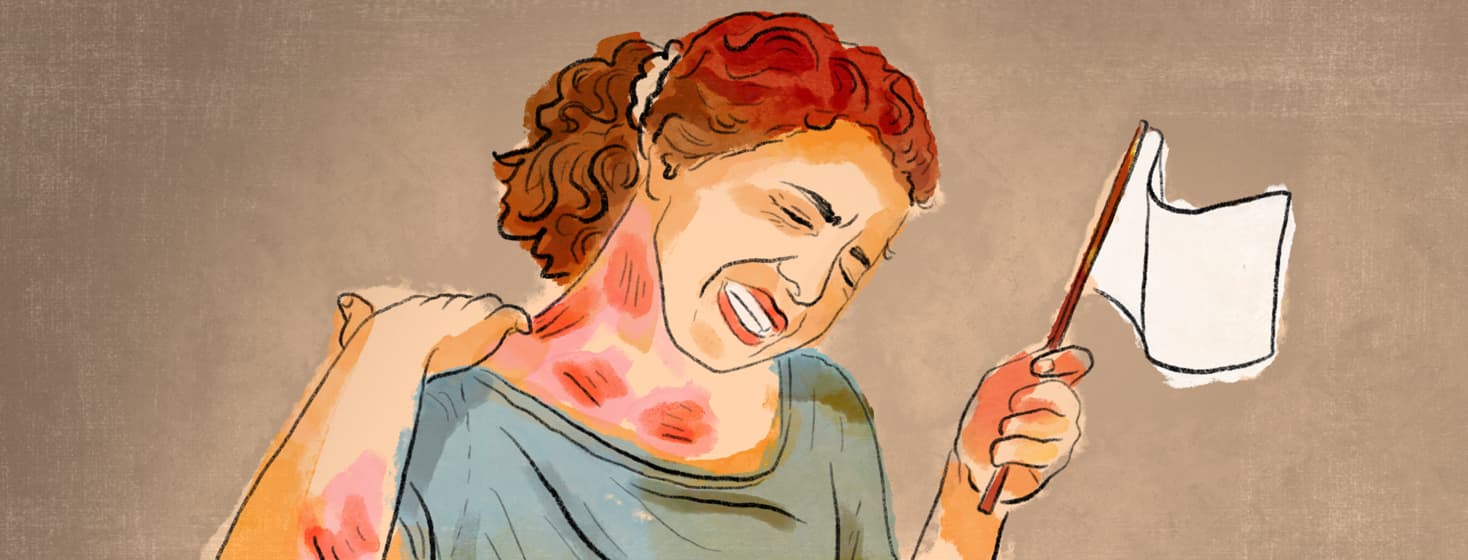Itchy Skin and Liver Disease Progression
Chronic, uncontrollable, itchy skin can change your quality of life. It can prevent you from getting a good night’s sleep and ruin your concentration. It can even lead to anxiety and depression.1
Most people deal with itchy skin, or pruritus, at some point. Causes include:1,2
- Exposure to poison ivy
- Allergies
- Age
- Dry air
But if your itch started on the soles of your feet or palms of your hands and then spread, it could be a sign of progressive liver disease.1,2
Liver disease and itchy skin are linked
Itchy skin that lasts more than 6 weeks and is due to liver disease is called hepatic pruritus. Other conditions that can lead to chronic itchy skin include:2,3
- Nerve damage
- Certain skin conditions
- Allergies
- Psychiatric conditions
The exact way progressive liver damage leads to itchy skin is poorly understood. One possibility is that liver disease causes a buildup of bile salts. These accumulate near the skin and may trigger itching. But not everyone with liver disease and high bile salt levels develops itching.3-5
A second possibility is that higher-than-normal bilirubin levels stimulate nerves that make you feel itchy. Bilirubin is a component of bile. Researchers have also found higher-than-normal levels of an enzyme called autotaxin in the blood of people who have itchy skin along with their liver disease. It is also possible that – in people with progressive liver disease – receptors in nerve tissues are stimulated by a release of opioids that naturally occur in the body.3,5-7
Symptoms
Depending upon the severity of your itch, you may experience:2
- Redness or raised skin from scratching
- Bumps or blisters
- Dry or cracked skin
- Scaly or leathery-looking patches
Your skin itches, so you scratch. With normal healthy skin, scratching relieves the itch. But scratching may make the skin itchier when the itch is due to an underlying disease. So, you scratch more. Harder. And instead of relief . . . it itches more. Welcome to the itch-scratch-itch cycle. Breaking it can be hard, but there is hope.2
Relieving the itch
Doctors have 4 main approaches to reducing itchy skin linked to liver disease:3
- Reduce substances in the blood that promote pruritus
- Change how the body processes (metabolizes) potential pruritus promoters in the liver and/or intestines
- Control the central itch/pain sensory pathway by disrupting nerve signals in the brain
- Change the perception of itch using light therapy
Your doctor may recommend cholestyramine to relieve hepatic pruritus. Cholestyramine works by removing bile acid from your body. However, this may or may not relieve your itching. Cholestyramine can also:3
- Give you abdominal discomfort
- Cause bloating
- Interfere with your body's ability to absorb fats and vitamins
If cholestyramine does not bring relief, your doctor may next recommend rifampicin. Rifampicin works by changing how the body metabolizes and rids itself of substances that may promote itching. If it is well tolerated, it can reduce hepatic pruritus and be safely taken for many years.3
If rifampicin does not work for you, your doctor may next recommend bezafibrate or fenofibrate. These drugs may improve bile secretions. Opioid receptor blockers (antagonists) such as naltrexone may be used next. Selective serotonin reuptake inhibitors (also known as SSRIs), such as sertraline or paroxetine, may also be prescribed. SSRIs are typically given to stabilize mood disorders. But, like opioid antagonists, they have a moderate anti-itch effect in some people.3
A drug approved for hepatic pruritis in Japan is nalfurafine hydrochloride. In a study that looked at people with chronic liver disease who had itching that did not go away when they took other drugs, 7 in 10 got relief with nalfurafine hydrochloride. Unfortunately, this drug is not currently approved or being investigated in trials in the United States.7
Talk to your doctor
Up to 20 percent of people with hepatitis C viral infection experience itchy skin. If you are one of them, you are not alone! Talk to your doctor about your symptoms. Let your doctor know how the itching is affecting your life.5,7

Join the conversation